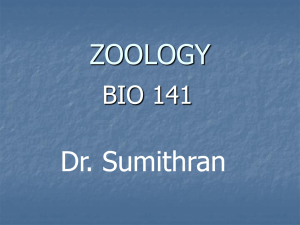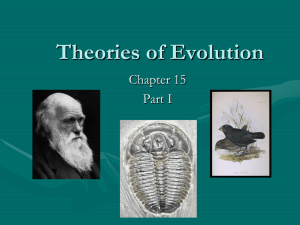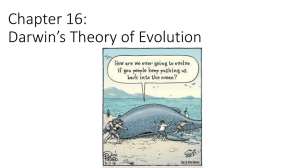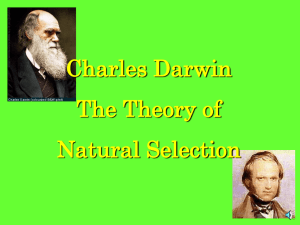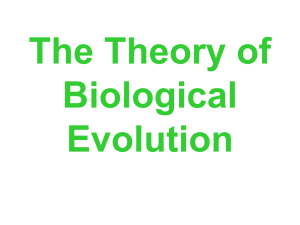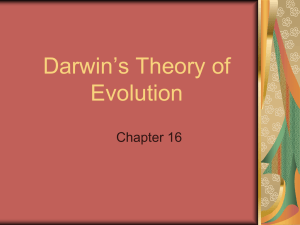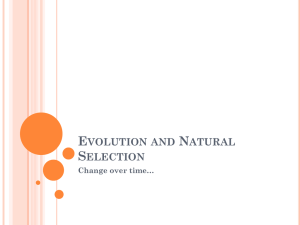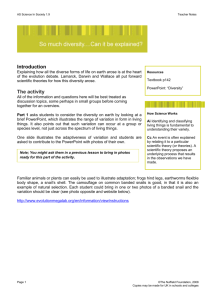Evolution: Darwin vs. Lamarck - Presentation
advertisement
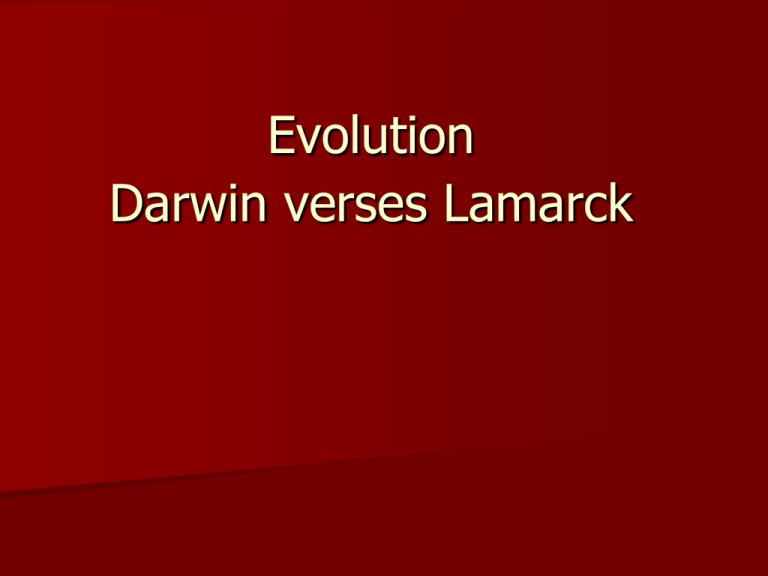
Evolution Darwin verses Lamarck Darwin’s Observations The The Galapagos Islands - Darwin observed that the characteristics of animals and plants varied noticeably among the different islands. In part two groups of organisms led Darwin to developing his theory – The shells of giant tortoises on the islands varied in predictable ways. The shape of their shell could be used to identify which island they came from – Darwin collected several specimens of birds with different shaped beaks, he came to no conclusion about this at first. Darwin Inherited Variation and Artificial Selection Darwin was aware that variation existed in nature - some plants in a species naturally bear larger fruit then others - some cows give more milk than others. Darwin was familiar with the concept of artificial selection - nature provides the variation - humans selected those variations that they found useful - Darwin wondered if artificial selection occurred in nature Darwin Evolution by Natural Selection Darwin suggested that there was a… A “Struggle for Existence” - members of each species compete regularly to obtain resources. -The predators that are faster or more cunning, could catch more prey - the prey that were faster, used camouflaged or protected themselves could avoid being caught. Darwin Evolution by Natural Selection Darwin stated that natural selection led to… “Survival of the Fittest” – organisms that are better suited to there environment survive and reproduce – Fitness, the ability of an individual to survive and reproduce in its specific environment. – Adaptation, any inherited characteristic that increases an organism’s chance of survival is – Over time natural selection results in changes in the inherited characteristics of a population. Darwin Evolution by Natural Selection Darwin’s Theory includes the principles of Descent with Modification - principle that each living species has descended, with changes, from other species, over time Common descent - principle that all living species, living and extinct, have a common ancestor. Evolution by Natural Selection Types of Adaptations Mimicry to copy other organisms for safety Carnivores plant to obtain nitrogen Camouflage to hide from predators or prey Long roots to increase surface area and large chance of gaining water in dry conditions Jean Baptiste Lamarck Born 1744 and died 1829. Like Darwin, Lamarck studied organisms and had ideas about how life on Earth got to be the way it is now. Lamarck Lamarck published a book titled “Theory of Inheritance of Acquired Characteristics,” 58 years before Darwin published his book. Lamarck proposed that….. - living things changed over time - if an organism changed during its life, those changes would pass on to it’s offspring. - Evolution occurs according to a predetermined plan and the results of the process have already been decided. Lamarck versus Darwin Lamarck believed it was the organism’s needs and desires that caused it to change and then pass those changes on to its offspring. – Through experiments and examples we see that changes in an animals life are not passed on to its offspring. (example: ear cropping in dogs) Lamarck versus Darwin – Darwin knew traits were passed from parent to offspring but didn’t know how. – We now know that genes carry traits from parents to offspring and that genes cannot be affected by the outside world. – The only thing that can be affected is which gene sets there are in a population and this is determined by which organisms dies and which ones live. How they agreed: Both thought that life had changed gradually over time and was still changing. Living things change to be better suited and adapted to their environments. All organisms are related. Life evolved from fewer simpler organisms to large numbers of more complex organisms. Evidence of Evolution Geographical Distribution of living things - similar animals living in different places were the product of different lines of evolutionary descent. Evidence of Evolution DNA - closely related species will have more similarities in their DNA and genes. - knowledge of DNA and protein synthesis is very recent. Evidence of Evolution Homologous Structures - structures that share common ancestry. - Example: wing, arm, and fin all have very similar number and organization of bones. Evidence of Evolution Developmental Patterns - Embryos off different organisms are very similar during embryonic development Evidence of Evolution Fossil Record - The fossil record provides evidence for history of life on earth. - Fossils are traces of dead organisms such as footprints, insects, bones, leaf impressions, etc. - Many things are now extinct (no longer living on earth) and fossils are the proof of their existence. Evidence of Evolution Evidence supporting Darwin’s theory has come from many sources: Earth is many millions of years old. (Hutton & Lyle) The processes that changed the earth in the past are the same as those changing the earth today (Hutton & Lyle) If a population was left unchecked it would run out of space and food (Malthus)
